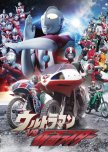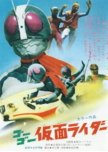- Français
- English
- magyar / magyar nyelv
- dansk
- Titre original: 仮面ライダーゴースト RE:BIRTH 仮面ライダースペクター
- Aussi connu sous le nom de: Kamen Raidā Gōsuto Ribāsu Kamen Raidā Supekutā ,
- Réalisateur: Kamihoriuchi Kazuya
- Scénariste: Fukuda Takuro
- Genres: Tokusatsu
Distribution et équipes
- Yamamoto RyosukeMakoto Fukami / Kamen Rider SpecterRôle principal
- Isomura HayatoAlain / Kamen Rider NecromRôle Secondaire
- Nishime ShunTenkuji Takeru / Kamen Rider GhostRôle Secondaire
- Osawa HikaruAkari TsukimuraRôle Secondaire
- Yanagi TakayukiOnari YamanouchiRôle Secondaire
- SotaroJavertRôle Secondaire
Critiques

Cette critique peut contenir des spoilers
Great supplement movie even Ghost haters will likely enjoy.
*Copied from my Letterboxd review.*Ghost is one of my top 5 Heisei Rider series despite all the pretty discernible flaws it has, one of which being Makoto's lackluster characterization, so I was curious to check this Makoto-centered film out to see if it could address that issue even a bit.
I'm happy to say it provided some of that (as best it could for a fixed hour-long V-Cinema runtime) and more on top of that.
One of the neater things about Ghost was how it created a two worlds setting, with the parallel (Ganma) world's politics touched upon (a bit loosely, but nice nonetheless) and the Ganma-native characters looking to be educated by, and bend, the politics of the "real" world, Alain observing humanity's errors as well as the Ganma world's own and trying to fix things. When Ghost wraps, it leans in to an optimistic light for Alain to be able to fix the Ganma world going forward even if we don't see it, but this movie provides more hard results and solid progress along with the troubles getting there.
The movie starts with Alain reflecting on the lives lost along the way to reach a new, hopeful trajectory, but his world is still ailing, people dying from the polluted skies, and he gets Akari, Igor and co to help him find a solution as he continues with minor remedies for some of the sick people in the meantime. People are growing impatient that the problem hasn't been fixed yet and doubtful of Alain's rule even as a relative to Adonis and Adel whose plans weren't able to fix things. In comes the new villain, Dantan, a formerly exiled engineer of sorts, a normal citizen otherwise, not from royalty, but also a different vocation and "radical" in a way with his ideas. He presents weird, alternative ideas from a weird, alternative perspective and plays to the unrest of the people as a demagogue when his true motives are corrupt, looking to turn people into his puppets, more expendable for his use and a "greater purpose".
How does Makoto play into this? In an interesting move, the film seems to direct the criticism about Makoto's hollow characterization in on itself, reflecting on his simplicity and lack of true ambitions and all. He turns out to be the master clone/puppet Dantan created among a sea of failed/in-progress Makoto & Kanon clones.
Dantan simultaneously downplays his agency given his nature while also exploiting Makoto's growing capacity for emotion and empathy as if leading him to naturally want to help his "creator" like a loved parental figure, though Makoto would be something of an exception to the homunculi of sorts Dantan wishes to create.
Makoto is lead to support Dantan, in turn, opposing Alain's ideals, believing Dantan's solution will work better, but guided by his pure desire for the Ganma world to be saved. Makoto turned on his good friend for the sake of his ideal, and then Dantan reveals his colder, manipulative side as things come to light - how he used similar words to the good-natured Ryu Tenkuji for (mostly) insidious ends, and Makoto sees his inhumanity, feels ashamed of harming Alain and being mislead in his noble pursuits, regretting his actions.
It is with this that Makoto reaches a self-awareness and evolves - his optimism is his own, his love for his sister is real to him, his betrayal and mistakes came about of his own will, as did his decision to change his course, now carrying on in atonement for his errors he made as a human, becoming Sin Specter. Makoto fights Dantan, who he still recognizes as one of his (multiple) father figures, and that his words have shaped him, but taking them to their purest root, arriving at his own conclusion in opposition to him and forging ahead.
The movie recontextualizes the loosely thrown about 'cogito ergo sum' philosophy throughout the series on free will into another thread, specific to Makoto, a man questioning his identity, feeling existential despair, disenfranchisement, and a new figure to support as a reflection of his values and substitute for his sense of self before coming to realizations himself, with some timely modern parallels.
Akari, Igor and the others' efforts to push forward with their own plans in spite of the meddling of Dantan and his prevailing worldview help to change things for the good, mostly in a roundabout, offscreen way, but clear enough, and the movie despite having some abridged structural notes given its more regimented format, still does quite well for itself. Takeru gets some time to NOT be in the spotlight and fight, instead encouraging another lost creation of Dantan's find a will to live, Alain starts to bring good change and hope to the Ganma World, and Makoto sets off with a renewed sense of self to still discover more of who he is, guided by the wills of his 3 father figures.
I think this is not just good for a Kamen Rider movie, but a pretty darn good movie in itself. While Makoto's development manifests in broader ways which don't entirely build on the nitty-gritty of his personality, his much improved agency and self-affirmation is greatly appreciated. Alain also gets a little more to him after stagnating a bit after his arc in Ghost, getting a new form for his boldest, most humane expressions of friendship in willing to confront Makoto in order to better help/save him is a nice further development from his more impersonal gestures and near apathy he started with in the series. Saionji's inclusion after being revived in the HBV is a bit odd and tacked on, but is still a nice note.
I had some concerns about the political representations between good & evil here at first (Alain from a monarch/nobility as good versus a normal citizen and general radical as evil) but the moral specifics won out and further illustrated the parallels better (Dantan using those people to heal himself as something expendable and selfish actions).
Politically charged, a bit introspective, and more of that strong emotional sensitivity seen throughout Ghost, it can't really stand on its own, but it's very good, I think it would even be appealing to people who don't like Ghost. Strongly recommended.
Cet avis était-il utile?
Recommandations
There have been no recommendations submitted. Be the first and add one.

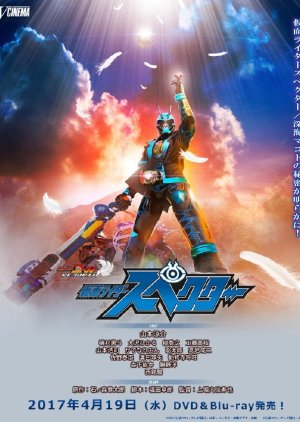






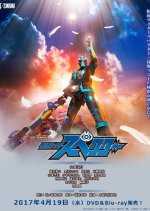





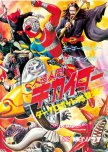
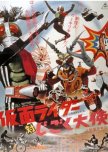
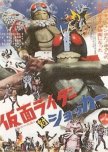

![Kaiju,Tokusatsu,Mecha,etc* [Multi-List]](https://i.mydramalist.com/aEgymt.jpg)
![Kaiju,Tokusatsu,Mecha,etc* [Multi-List]](https://i.mydramalist.com/Zbd0q_4t.jpg)
![Kaiju,Tokusatsu,Mecha,etc* [Multi-List]](https://i.mydramalist.com/YAZ2gt.jpg)
![Kaiju,Tokusatsu,Mecha,etc* [Multi-List]](https://i.mydramalist.com/9xYJyt.jpg)
![Kaiju,Tokusatsu,Mecha,etc* [Multi-List]](https://i.mydramalist.com/xbjEr_4t.jpg)
